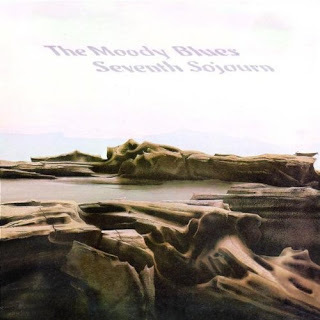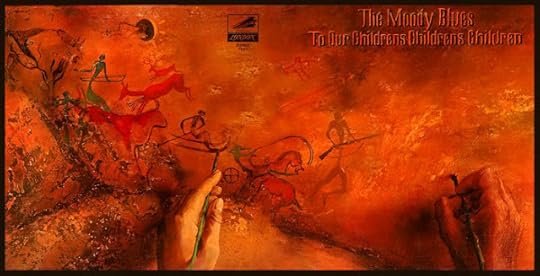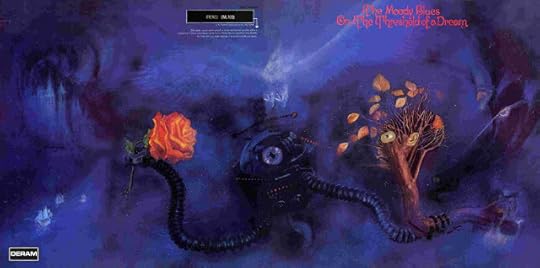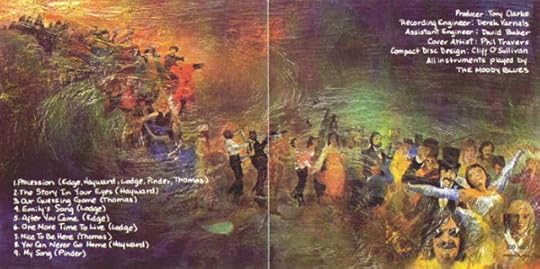The Moody Blues
 You flip through the vinyl at your fave record shop and come across The Zombies. You know the songs, "Tell Her No," "She's Not There" and "Time of the Season," among the best singles the 60s have to offer, but you've never heard the misspelled LP called Oddessey and Oracle. Turns out to be one of the stellar albums of 1968, and you pick it up for a couple bucks because no one's ever heard of it. Like S.F. Sorrow, another dismissed tour de force, you figure it's a score and now you're privy to what others are not. Someday you'll happen upon Blue Cheer's Vincebus Eruptus or you'll find Badger's debut, a live LP, and buy it simply because of the incredible Roger Dean cover. So, it's dumb luck, but how can a band whose first seven LPs (discounting the fledgling debut), be so readily dismissed? Of course I'm referring to The Moody Blues. No doubt, die hard fans still flock to Red Rocks, but when we read of the greatest LPs of all time, the Moodys are mostly forgotten. Our little website can't fix that, but we can acknowledge a ten year stint that embraced pop and psychedelia like a boss. What follows may seem but a boring list. It's my justification for the elevation of The Moodys as one of the greatest bands in the rock canon, purveyors of the concept and the catalyst of art rock.
You flip through the vinyl at your fave record shop and come across The Zombies. You know the songs, "Tell Her No," "She's Not There" and "Time of the Season," among the best singles the 60s have to offer, but you've never heard the misspelled LP called Oddessey and Oracle. Turns out to be one of the stellar albums of 1968, and you pick it up for a couple bucks because no one's ever heard of it. Like S.F. Sorrow, another dismissed tour de force, you figure it's a score and now you're privy to what others are not. Someday you'll happen upon Blue Cheer's Vincebus Eruptus or you'll find Badger's debut, a live LP, and buy it simply because of the incredible Roger Dean cover. So, it's dumb luck, but how can a band whose first seven LPs (discounting the fledgling debut), be so readily dismissed? Of course I'm referring to The Moody Blues. No doubt, die hard fans still flock to Red Rocks, but when we read of the greatest LPs of all time, the Moodys are mostly forgotten. Our little website can't fix that, but we can acknowledge a ten year stint that embraced pop and psychedelia like a boss. What follows may seem but a boring list. It's my justification for the elevation of The Moodys as one of the greatest bands in the rock canon, purveyors of the concept and the catalyst of art rock.May 4, 1964: The Moody Blues, consisting of Denny Laine (lead vocals, guitar), who would go on to play guitar for Wings, Ray Thomas (vocals, tambourine, flute), Mike Pinder (vocals, mellotron, piano), Clint Warwick (vocals, bass guitar), and Graeme Edge (vocals, drums), form in Birmingham.
Spring, 1964: The single "Steal Your Heart Away/Lose Your Money(But Don't Lose Your Mind)" is released to commercial failure in the UK. The Moody Blues appeared on the UK TV series Ready, Steady, Go to promote the B side.
October, 1964: The Moody Blues record their debut The Magnificent Moodies at Decca Studios in West Hampstead, London.

October 30, 1964: The Moody Blues perform at the Crawdaddy Club in London, England.
November, 1964: The single "Go Now," is released to critical and commercial success. The single peaked at No. 1 on the UK Singles Chart, and at No. 10 on the Billboard Hot 100 in the US.
July 22, 1965: The Magnificent Moodies, is released to regional, critical and commercial success. The album peaked at No. 5 in the UK, but failed to chart in the US.
October, 1966: Rod Clark departs from the Moody Blues. Denny Laine departs as well.
November, 1966: After a brief hiatus, The Moody Blues re-form, with John Lodge replacing Rod Clark on Bass Guitar and Justin Hayward replacing Denny Laine on lead vocals and guitar. Here then is where it gets good. For the next year, the Moodys face a lack of success that would have split the average band, but…October 8, 1967: The Moody Blues go into Decca Studios in West Hampstead, London, England, to record their second album, the concept album Days of Future Passed. Initially conceived as a merging of classical music and rock, the LP was meant as a stylized version of Antonín Dvořák's Symphony No. 9, also known as the New World Symphony. Of their own volition and despite Decca's new label, Deram, dismissing the idea,the concept LP was born (many will point to Pet Sounds and In the Wee Small Hours of the Morning, but that's splitting hairs) The concept of this album, a day in the life of everyman, features the London Festival Orchestra.

November 11, 1967: Days of Future Passed, featuring the songs "Tuesday Afternoon," and "Nights in White Satin," is released to critical and commercial success. The album peaked at No. 27 on the UK Albums Chart and No. 3 on the Billboard 200 in the US. "Tuesday Afternoon" peaked at No. 24 on the Billboard Hot 100, while failing to chart in the UK, and "Nights in White Satin" rose to No. 9 on the UK Singles Chart and No. 2 on the Billboard Hot 100 in the US, respectively.
January, 1968: The Moody Blues record In Search of the Lost Chord at Decca Studios in West Hampstead, London. The concepts of the LP are quest and discovery.
July 26, 1968: In Search of the Lost Chord, featuring the single "Ride My See-Saw," and cult fave "Legend of a Mind," is released to critical and commercial success.
November 8, 1968: The Moody Blues perform at the Electric Factory in Philadelphia, Pennsylvania.
November 24, 1968: The Moody Blues perform at the Fillmore West in San Francisco, California.

January 12, 1969: The band head back to Decca Studios to record their fourth album, the concept LP On the Threshold of a Dream. The concept, duh, is dreams.
April 25, 1969: On the Threshold of a Dream peaks at No. 5 on the UK Albums Chart and No. 23 on the Billboard 200 in the US.
May, 1969: Just three months later, The Moody Blues record their fifth album, yes, indeed, a concept LP, To Our Children's Children's Children.
October, 1969: The single "Watching and Waiting" is released to commercial failure, selling about ten copies (half of which were purchased by the Moody Blues themselves).
November 21, 1969: To Our Children’s Children’s Children is released to critical and commercial success. The album peaked at No. 2 on the UK Albums Chart and No. 14 in America.
January 17, 1970: The band record their sixth album, A Question of Balance.
April, 1970: The single "Question" is released to critical and commercial success. The single peaked at No. 2 in the UK and No. 21 on the Billboard Hot 100.
August 7, 1970: A Question of Balance is released to critical and commercial success. The album is their most successful, reaching No. 1 in the UK and No. 3 in the US.
November, 1970: The Moodys head to Wessex Studios in London to record their seventh album, Every Good Boy Deserves Favour.

July 23, 1971: Every Good Boy Deserves Favour, featuring the songs "Procession" and "The Story in Your Eyes,"is released to critical and commercial success. The album rose to No. 1 on the UK Albums Chart and No. 2 on the Billboard 200 in the US. "The Story in Your Eyes" reached No. 23 on the Billboard Hot 100.
January, 1972: The Moody Blues go into Decca, Tollington Park Studios, London to record their eighth album, Seventh Sojurn.
April, 1972: The single "Isn’t Life Strange" is released to critical and commercial success.
November 17, 1972: Seventh Sojurn is released to critical and commercial success. The album makes No. 5 on the UK Albums Chart and No. 1 on the Billboard charts.
Published on January 26, 2019 10:04
No comments have been added yet.



